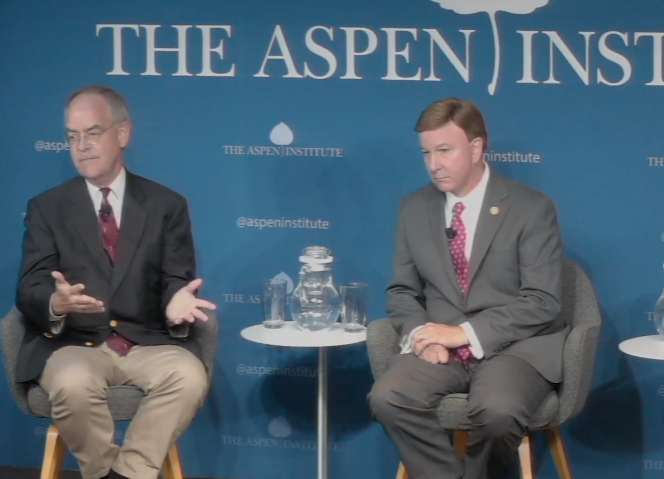
Rep. Jim Cooper (D-Tenn.), left, and Rep?. Mike Rogers (R-Ala.), right, spoke at a Sept. 27 Aspen Institute event on the creation of a Space Force. YouTube screenshot.
The Air Force’s five-year $13 billion estimate for the creation of an independent Space Force is high, and likely doesn’t cover cost savings that could come through offsets, said Rep. Mike Rogers, the lawmaker who has been the biggest voice behind the move to create the new service.
Rogers, the Republican chairman of the House Armed Services Strategic Forces subcommittee, said during an Aspen Institute event Thursday that the Air Force’s proposal, which includes an endstrength of about 13,000 personnel, is a “huge organization,” which brings in the intelligence community as well.
The House Armed Services Committee’s approach, however, is to create a separate force with a smaller footprint by taking existing personnel in the military services, instead of hiring anyone else. This move would reportedly have “no additional cost of significance” until the new service is up and running, when more investment would be needed to build the mission.
The $13 billion estimate does not include offsets, for example, the cost savings by taking space missions and infrastructure out of Air Force, Navy, and intelligence community budgets, Rogers said. However, it is still too soon to have an accurate estimate of the possible costs, he said.
“What I would invite anybody to do is to wait and see” what’s actually in the budget request, “and what we actually go along with,” Rogers said.
The 2020 timeframe is “very doable” if the proposal is kept narrow, he said. Rep. Jim Cooper (D-Tenn.), the ranking member of the HASC Strategic Forces subcommittee, was more hesitant, however. The creation of a new combatant command is doable by 2020, but not the creation of the separate military service. The Pentagon is planning to stand up the combatant command, US Space Command, by the end of the calendar year.
Still, there is consensus in the House and if “key senators” are brought on board as the proposal comes forward, there could be “greater unanimity” overall, Cooper said.